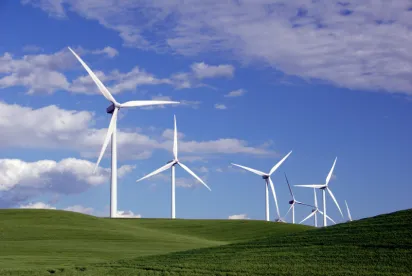Legislation would require that 100% of California’s electricity be generated from renewable sources by 2045—with an interim goal of 50% generation by the end of 2025.
On February 17, 2017, California Senate President pro Tempore Kevin de León (D-Los Angeles) proposed legislation (SB 584) that would require California to generate 100% of its electricity from renewable sources by 2045. The bill also would require California to reach an interim goal of 50% renewable by the end of 2025, accelerating the 50%-by-2030 mandate currently in place. If approved, SB 584 would match Hawaii’s renewable portfolio standard (RPS), which is currently the most aggressive RPS in the United States.
The bill represents the latest step in California’s efforts to take the lead in renewable energy, which date back to the early development of large-scale wind projects and the world’s first concentrating solar power plants in the 1980s.
Passing SB 584—Challenges and Support
Whether the bill will pass remains to be seen. On the one hand, ratepayer groups, electric utilities, and conventional generation have a strong political presence in California and are likely to raise a formidable challenge by portraying SB 584 as an expensive strategy for meeting California’s aggressive greenhouse gas (GHG) reduction goals. They will argue that other strategies (e.g., electrifying the transportation sector) are likely to achieve GHG reduction goals at a lower cost and with greater grid reliability, in part because they allow for the continued use of relatively cheap natural gas. On the other hand, de León’s Democratic Party controls both houses of the California State Legislature, Governor Jerry Brown is an outspoken proponent of renewable energy, and renewable energy enjoys broad-based support—including from labor, which stands to benefit from the jobs that a 100% RPS mandate would create.
One thing is clear, however: The bill that is eventually voted on will look different than the bill currently proposed. In fact, many commentators speculate that the bill, which was introduced shortly before the state’s bill-filing deadline, serves merely as a placeholder to be fleshed out at a later date. As drafted, SB 584 does not address a number of key issues, including the fact that various renewable sources are currently excluded from the RPS in California. For example, the bill says nothing about rooftop solar, which is not currently considered in the RPS. Large hydroelectric power also is not considered, even though such generation in a normal water year provides upwards of 20% of California’s electricity. The bill also says nothing about where the renewable energy can be generated (i.e., in-state or out-of-state generation), a major issue in the past from labor’s perspective. All of these points underscore the fact that the bill will need to be amended to recognize these and other complicating issues associated with a 100% RPS.
Implications for Industry
A 100% RPS will necessarily drive not only another wave in renewable energy project development in and around California but also a concurrent boom in energy storage project development. The state’s load serving entities already have an obligation to procure energy storage on a limited basis. The 100% RPS will occasion the need for purchases of bulk storage on a massive scale because the 100% renewable power grid will be heavily dependent on intermittent wind and solar resources that must be backstopped when the wind is not blowing and the sun is not shining. If dispatchable gas-fired generation is pushed off the system as contemplated by SB 584, energy storage—whether by way of chemical or flow batteries or by pumped hydroelectric storage facilities—will be critical to ensure that power is available to meet load.








 />i
/>i

